Posts Tagged ‘Human Rights’ (685 found)
Joint Statement of Karen Women’s Groups in Support of the Reunification of the Kawthoolei Armed Forces (KAF)
The Karen Women’s Organization (KWO), Karen Women’s Empowerment Group (KWEG) and Karen Women’s Union (KWU) welcome the announcement, on October 13th, 2014, of the Karen armed resistance groups coming together under the name of “Kawthoolei Armed Forces (KAF)”. The alliance of 4 Karen armed forces meets the long held desire of Karen people everywhere, especially of Karen women. We believe this is an opportunity for both peace building, and improved co-operation which can help reduce violence against women […]
• • •Document – Myanmar: Media Workers Jailed for Two Years
Five media workers have been sentenced to two years in prison in Myanmar over the publication of a news story. They are prisoners of conscience, detained solely for peacefully exercising their right to freedom of expression […]
• • •Tanitharyi Divison Villagers Call For Development Projects To Stop As Govt Grants Hundred Of Thousands of Acres To Business Interests
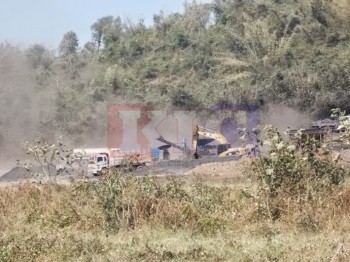 Representatives from civil society groups, religious leaders and villages in the Tanitharyi Division have sent a petition letter to both the government’s Division Chief Minister and the Karen National Union’s Megui/Tavoy District chairperson to try to get development projects stopped that villagers claim are health hazards.
Representatives from civil society groups, religious leaders and villages in the Tanitharyi Division have sent a petition letter to both the government’s Division Chief Minister and the Karen National Union’s Megui/Tavoy District chairperson to try to get development projects stopped that villagers claim are health hazards.
The petition sent on October 13, was signed by 125 representatives from 46 villages, members of civil society organizations such as Tarkapaw, Community Sustainable And Livelihood Development,Trip-Net, Dawei Development Association and religious leaders in the region […]
• •69th Session of the UN General Assembly – Situation of human rights in Myanmar: Report of the Special Rapporteur on the situation of human rights in Myanmar
I. The mandate of the Special Rapporteur on the situation of human rights in Myanmar was established pursuant to Commission on Human Rights resolution 1992/58 and recently extended by Human Rights Council resolution 25/26. The present report is submitted pursuant to Council resolution 25/26 and General Assembly resolution 68/242.
II. Background
2. Following the completion of the term of the previous mandate holder, the current mandate holder took up her functions only in June 2014, which resulted in a shorter period than usual to conduct a country visit and review the information gathered. The present report therefore sets out the Special Rapporteur’s preliminary observations, to be supplemented by her oral statement to the General Assembly […]
• • •The Shell Starts to Crack? Real Owners of Myanmar’s Oil and Gas Come Forward
Corrupt politicians all over the world use companies and trusts with hidden ownership to seize public property worth billions of dollars. This deprives ordinary citizens of money that should be spent on development and empowers unaccountable elites, often helping them gain and maintain power at the expense of democracy, human rights and peace.
Revealing the real people behind companies is critical to achieving genuine reform in Myanmar, where military families and crony tycoons have long benefited from control of natural resources like gas and gemstones. This is a critical time—in July 2014, Myanmar became a candidate member of the Extractive Industries Transparency Initiative (EITI), a global transparency standard which recommends that the
identities of individuals who own and control oil, gas and mining companies are published. If Myanmar can meet the standard, it will go a long way to addressing the question of who really owns the companies that control the country’s most valuable natural assets […]
Burma: Judicial Harassment and Arbitrary Detention of Ms. Phyu Hnin Htwe
The Observatory for the Protection of Human Rights Defenders, a joint programme of the International Federation for Human Rights (FIDH) and the World Organisation Against Torture (OMCT), requests your urgent intervention in the following situation in Burma […]
• • •Myanmar Takes Global Lead on Company Ownership Transparency
25 oil and gas companies in Myanmar have set a global precedent by publishing who their real owners are, said Global Witness in a new report published today.
“People need to know who is buying up their most valuable assets – this is a global first in one of the places you might least expect it,” said […]
• • •World Bank Group: Tackle Burma Rights Concerns
(Washington, DC) – The World Bank Group should act to overcome Burma’s major human rights problems in its new strategy for the country, Human Rights Watch said in a submission to the bank released today. Key issues include rights violations against ethnic minorities, widespread land grabs, and systematic corruption […]
• • •The Myanmar National Human Rights Commission Continues Failing to Deliver
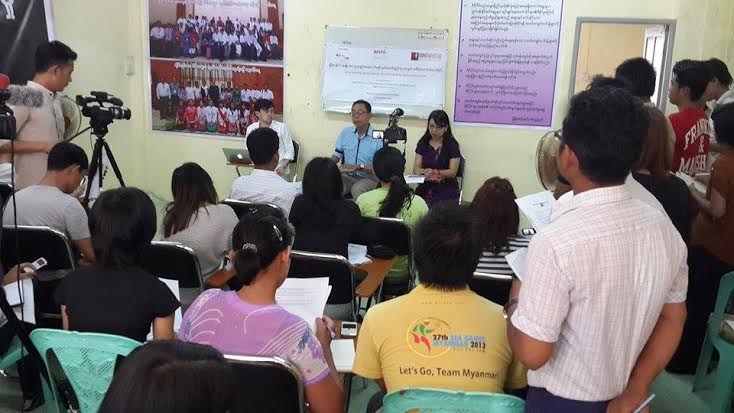 A report authored by Burma Partnership and Equality Myanmar was launched on 25 September 2014 in Rangoon revealing the continuing ineffectiveness of the Myanmar National Human Rights Commission (MNHRC) as well as the lack of independence from the government. The report was launched on the same day that a reshuffle of the members of MNHRC was announced by the government, which came as a complete surprise to civil society organizations due to the lack of consultation.
A report authored by Burma Partnership and Equality Myanmar was launched on 25 September 2014 in Rangoon revealing the continuing ineffectiveness of the Myanmar National Human Rights Commission (MNHRC) as well as the lack of independence from the government. The report was launched on the same day that a reshuffle of the members of MNHRC was announced by the government, which came as a complete surprise to civil society organizations due to the lack of consultation.
Released at the Myanmar Journalists Network in Rangoon, Burma: All the President’s Men, contributed to the annual Asian NGO Network on National Human Rights Institutions (ANNI) Report on the Performance and Establishment of National Human Rights Institutions in Asia (2014). The report analyzes the Myanmar National Human Rights Commission Law 2014 enacted in March this year (enabling law) that institutionalizes the mandate of the MNHRC. The report finds that the law does not guarantee independence from the government and in particular, the president’s office. In contravention of international standards on national human rights institutions, namely the Paris Principles, the selection process does not adequately consult with civil society. As the report points out, “It is up to the selection board to come up with procedures for short-listing candidates, yet the enabling law itself should set out the process/procedure for selection, with consultations with civil society.” The members of the MNHRC are actually chosen by a selection board of ten, five of which are from the government or are government-affiliated. The enabling law states that two members of this board are to come from civil society organizations and a further two are to be MP, yet there is no transparency regarding the procedures under which the two MPs are chosen. Additionally, the chosen civil society members to the selection board are restricted to registered civil society only, thus excluding many outspoken and critical political and human rights groups who feel they cannot register under the current climate […]
• • •Arrest of Student on Trumped-up Charges is a Damning Indictment of Justice in Burma
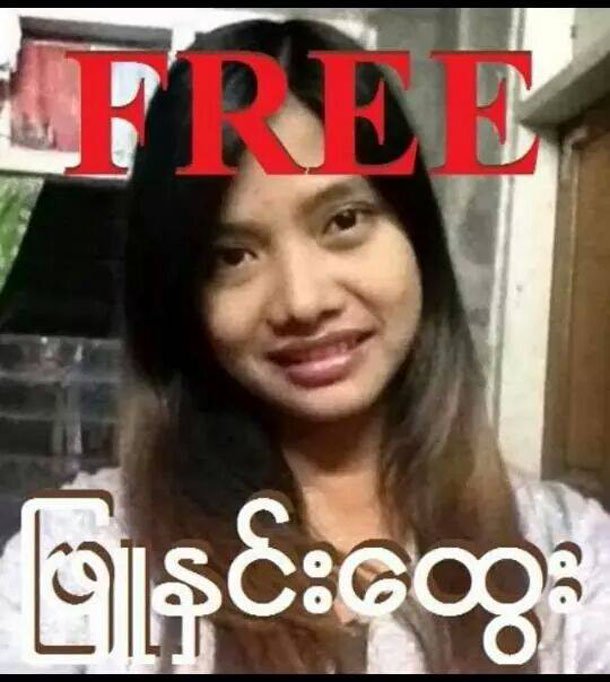 On 13 September 2014, police arrested female human rights defender (HRD) Phyu Hnin Htwe at her house in Patheingyi Township, Mandalay Region, and sent her to Monywa Prison, Sagaing Region, where she is currently being detained. Phyu Hnin Htwe is a second-year Burmese student at Mandalay’s Yadanabon University, and is also an activist and member of the All Burma Federation of Student Unions (ABFSU). She has helped farmers who have been forcibly evicted to make way for the infamous Chinese-backed Letpadaung copper mine in Sagaing Region, going to the Letpadaung area at weekends and supporting displaced farmers.
On 13 September 2014, police arrested female human rights defender (HRD) Phyu Hnin Htwe at her house in Patheingyi Township, Mandalay Region, and sent her to Monywa Prison, Sagaing Region, where she is currently being detained. Phyu Hnin Htwe is a second-year Burmese student at Mandalay’s Yadanabon University, and is also an activist and member of the All Burma Federation of Student Unions (ABFSU). She has helped farmers who have been forcibly evicted to make way for the infamous Chinese-backed Letpadaung copper mine in Sagaing Region, going to the Letpadaung area at weekends and supporting displaced farmers.
Her arrest ostensibly relates to a murky incident that took place on 18 May of this year. Two Chinese workers – employees of Wanbao company, the main company involved in the joint venture – were seized from the Letpadaung area, taken to a monastery in Hsete Village, and held there for about 30 hours. The incident followed efforts by Wanbao employees to restart measuring plots of land for which compensation had not even been provided, in spite of villagers’ protests, thereby provoking their anger.
As a result, Phyu Hnin Htwe and six villagers were charged with kidnapping and abduction under Articles 364 and 368 of the Penal Code, which prescribe sentences of up to ten years’ imprisonment. While the case against five of the villagers was quickly dropped, charges still remain against Phyu Hnin Htwe and local villager Win Kyaw, neither of whom attended court in May […]
• • •
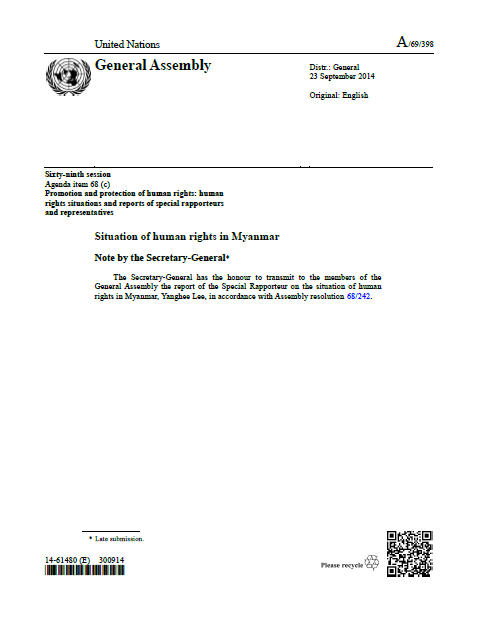
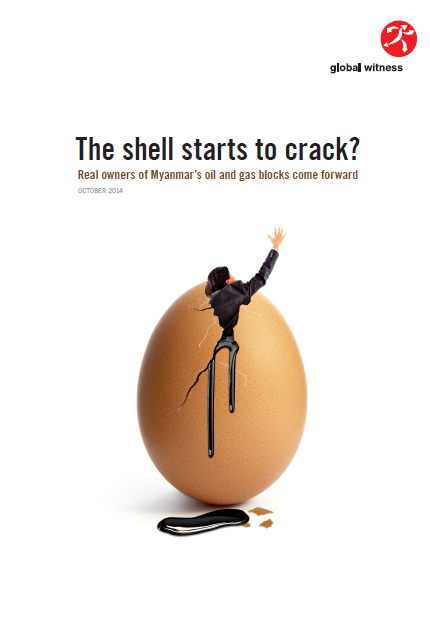








 All posts
All posts